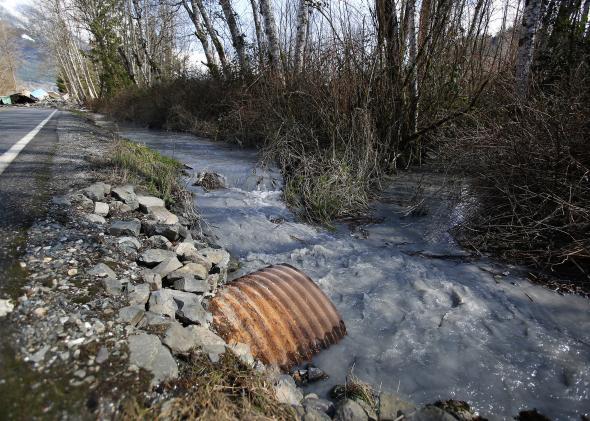This post originally appeared on Strong Language, a sweary blog about swearing.
Schitt’s Creek. There. I said it. Which is more than David Bianculli, TV critic for NPR’s Fresh Air, was able to do on Tuesday in his review of this new sitcom. It’s a show about a rich family, the Roses, that loses everything except the deed to a town purchased decades earlier as a joke. Here’s Bianculli twisting himself into Federal Communications Commission–approved knots:
The name of the town also is the name of this TV series, and there’s a reason the deed to the town was bought as a joke. It’s a joke I can’t say on the radio, but the second word is creek. The first is spelled S-C-H-I-T-T-apostrophe-S and rhymes with spits. From now on, I’ll just call it Creek.
Schitt’s Creek had its debut last month in Canada, on the CBC, and made its U.S. debut Wednesday on the cable channel Pop, which is what the TV Guide Network has renamed itself. The famously taboo-averse New York Times took a bold stance and printed the title of the series in its (lukewarm) review. But on the primly and grimly patrolled airwaves no one can hear that expletive-sparing C.
(Oddly, though, weekend anchor Scott Simon got away with it—“That’s Schitt with a C”—in an interview that aired on NPR Feb. 7. Maybe it’s just Fresh Air that doesn’t like to get fresh.)

Photo by Lindsey Wasson/The Seattle Times-Pool/Getty Images
Eugene Levy, the veteran comic actor (SCTV, Best in Show, A Mighty Wind) who created Schitt’s Creek with his son, Dan, was “prepared for some blowback” about the title, the Toronto Star reported last month. The Levys père et fils:
[W]ent through phone books to see if the name Schitt actually existed. It did. And they gave pages from directories featuring the name to the public broadcaster to prove their point.
“We argued that if CBC was doing a news broadcast with the name Schitt, would you not use it?” Levy told the Star in an interview. “They said, ‘Yes, we would air the name.’ So we called the show Schitt’s Creek.”
My favorite smutty-lingo tidbit from that story: The show is filmed in the real town of Goodwood, Ontario. (A tip of the hat to James Harbeck for the link.)
Shit creek or shit’s creek (“an unpleasant situation or awkward predicament”) is no shitty-come-lately, according to the Oxford English Dictionary. “Up shit creek” first appeared in print in 1868 in no less august a publication than the Annual Reports of the (U.S.) Secretary of War: “Our men put old Lincoln up Shit creek, and we’ll put old Dill up.” In 1939, the American novelist John Dos Passos wrote, in Adventures of a Young Man, “They had a hard time finding their way through the woods … ‘Well, we’re up shit creek without any paddle.’” Our British brethren took up the idiom with some relish: Noël Coward used it in a 1956 diary entry (“Added to their discomfiture, Ford must have realized that they have nothing prepared for 5 May and that frankly they are up shit creek without a paddle”), and Private Eye, the satirical and public-affairs magazine, published this sentence in 1981: “If they’d followed her this far up shit creek it’s a long way to walk back.”
The New York Times’s Mike Hale couldn’t resist adding to the record. He ends his lukewarm review: “If you choose to watch, maybe some of that potential will be realized, or maybe you’ll just find yourself up 13 episodes without a paddle.”